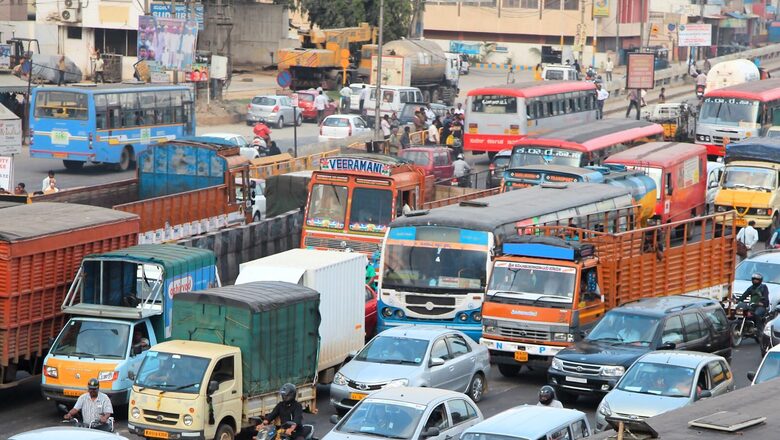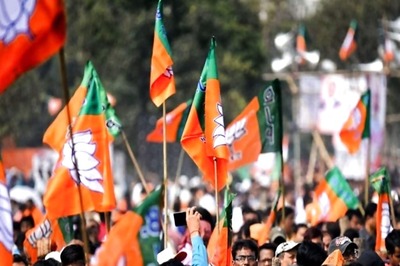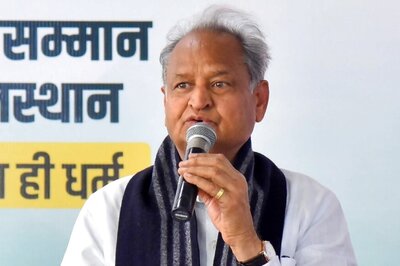
views
Finance Minister Nirmala Sitharaman announced the 2022 Union Budget in February, during which she stressed on the importance of electric mobility, and switching to sustainable and clean options. Meanwhile, many states have also introduced electric vehicle policies to boost the faster adoption of EVs in India, while focusing on charging infrastructure.
Available data has highlighted the fact that the introduction of several policies and the central government’s continuous push for the adoption of EVs have resulted in positive outcomes, increasing EV penetration in the Indian market.
As of July 14, Uttar Pradesh, Delhi, and Karnataka have emerged as the top 3 EV using states compared to others.
Central government initiatives
The National Electric Mobility Mission Plan or NEMMP, introduced in 2013, is an initiative of the government that offers a roadmap for accelerating the use of EVs in the country and domestic production of those vehicles to ensure national fuel security.
NEMMP was established as a guideline for all the initiatives, schemes, policies and other interventions of the government for e-mobility. The plan went into effect in 2020.
As part of the NEMMP, the Ministry of Heavy Industries developed the FAME India Scheme (Faster Adoption and Manufacturing of Electric & Hybrid Vehicles in India scheme) in 2015 to encourage the use of e-mobility in the country.
During the recent parliamentary session, the Minister of State for Heavy Industries Krishan Pal Gurjar said: “At present, Phase-II of FAME India Scheme is being implemented for a period of 5 years w.e.f. April 1, 2019, with total budgetary support of Rs 10,000 crore.”
Under the FAME scheme, the incentive is given in the form of subsidies to infrastructure providers and EV makers in order to increase the production of such vehicles and the development of an infrastructure for e-mobility. The first phase began in 2015 and ended in March 2019, while the second phase started in April 2019.
However, the government has extended the FAME II scheme for 2 years and now it will be applicable till March 31, 2024.
Additionally, the Centre has approved the Production Linked Incentive (PLI) Scheme ‘National Programme on Advanced Chemistry Cell (ACC) Battery Storage’ with a budgetary outlay of Rs 18,100 crore for achieving a manufacturing capacity of 50 GWh of ACC for enhancing India’s Manufacturing Capabilities and to generate higher domestic value addition while also ensuring that the levelised cost of battery manufacture in India remains globally competitive.
EVs are covered under the PLI scheme for Automobile and Auto Components, which was approved in September last year with a budgetary outlay of Rs 25,938 crore for a period of five years, according to MoS Gurjar.
The minister also told the parliament that GST on EVs has been reduced from 12% to 5%, while GST on chargers/ charging stations for EVs has been reduced from 18% to 5%.
States’ bid to support EV ecosystem
People are already opting for EVs, while there is still a need for infrastructure. EV policies at the national and state levels are expected to make it possible and support research, charging infrastructure, and appropriate skill development strategies.
Currently, all over India, there are more than 13,00,000 EVs running on the roads, while non-electric vehicles are still in majority.
It is believed that though the switch from petrol/ diesel vehicles to e-mobility is ongoing, the lack of charging infrastructure has been a concern among prospective EV buyers.
But many state government policies aim to work on this particular issue, while the Centre is also providing the required support to increase the EV popularity.
Andhra Pradesh
Under the Electric Mobility Policy 2018-23 the government has approved benefits covering the areas of manufacturing, charging infrastructure, demand creation and research and development to make projects under these areas viable.
By 2024, the state government aims to have 10 lakh EVs, combined across all segments of vehicles and 1,00,000 slow and fast charging stations in the state.
Here it should be noted that as of July this year, the Ministry of Heavy Industries has sanctioned 266 EV charging stations for the state.
Assam
This EV policy was released in July last year that will be in effect over a 5-year period until 2026.
During this time, the policy focuses on creating an enabling charging infrastructure to assist the state’s faster adoption of EVs.
According to the central government’s data, Assam currently has over 64,700 EVs on road as of July 2022.
For the Mangaldai-Wakro highway, which connects Assam and Arunachal Pradesh, the Ministry of Heavy Industries has sanctioned 64 charging stations.
Chandigarh
Its “Draft EV Policy 2022” will be valid for 5 years. This policy’s vision is to facilitate zero-emission mobility uptake for reaching carbon neutrality in Chandigarh by 2030.
It also aims to establish a wide network of charging points by enabling the availability of power supply and related processes and harnessing renewable energy sources for charging EVs.
As per government data, the UT has 2,812 EVs on road as of July 14.
Additionally, under the Phase I FAME India Scheme, the Ministry of Heavy Industries has sanctioned 48 charging stations, while under the FAME Phase II, 70 charging stations have been sanctioned. Particularly for the Delhi- Chandigarh highway, the number is 24 as of July 1.
Goa
Goa’s EV Concessional Charging Infrastructure Policy was unveiled, pledging support for the building and operation of EV charging infrastructure.
As of July 14, Goa has 3,870 EVs on the road, according to the data shared during the recent parliament session.
It is noteworthy that under the FAME Phase I, the Ministry of Heavy Industries has sanctioned 30 charging stations as of July 1 for Goa.
Gujarat
The EV Policy 2021 was announced with an aim to have 2 lakh EVs on the roads in the next 4 years.
During the duration of this EV policy, the State Government will exclude EV charging stations from paying 100% power duty and petrol pumps will be approved for establishing charging stations.
Currently, the state has over 45,000 EVs on the road.
Under the FAME Phase II, the Ministry of Heavy Industries has already sanctioned 278 charging stations. It is noteworthy that for Ahmadabad – Vadodara expressway, the ministry has sanctioned 10 charging stations.
Karnataka
Its EV and Energy Storage Policy calls for the government to explore possible long-term lease sites for EV charging stations and battery swapping infrastructure. Incentives will also be offered for the installation of the first batch of 100 fast charging stations under this policy.
As of July, Karnataka has 1,20,532 EVs on road, according to the central government’s data.
While under the FAME Phase I and II Ministry of Heavy Industries have sanctioned 65 and 172 EV charging stations respectively for this state, the ministry has sanctioned 14 and 30 charging stations for Bengaluru-Mysore and Bengaluru-Chennai Express Highways respectively.
Maharashtra
Under Maharashtra’s EV policy 2021 one of the targets is to establish at least one Gigafactory for the manufacturing of ACC batteries in the state.
Other highlights of the policy include demand incentives that will be available for public and semi-public charging stations.
As of July, the data showed that the state has 1,16,646 EVs on the road.
Furthermore, under FAME Phase II the Ministry of Heavy Industries has sanctioned 317 EV charging stations for Maharashtra.
It should be also noted that 10 charging stations have been sanctioned by the ministry for Mumbai-Pune Expressway, while for Mumbai – Delhi, Mumbai-Panaji, Mumbai – Nagpur and Mumbai – Bengaluru highways the sanctioned numbers are 124, 60, 70, and 100.
Tamil Nadu
Under its EV Policy 2019, the government aims to provide incentives and concessions to encourage investment in EV production, EV charging infrastructure manufacturing, and equipment manufacturing firms.
According to the central government’s data, there are 82,051 EVs on the roads of Tamil Nadu currently.
Under the FAME Phase II, the Ministry of Heavy Industries has sanctioned 281 charging stations for the state.
More specifically, for Chennai-Bhubaneswar, Chennai – Trivandrum, Chennai-Ballary and Chennai – Nagpur highways the ministry has sanctioned 120, 74, 62 and 114 charging stations as of now.
Telangana
Telangana EV and ESS Policy are applicable for a period of 10 years.
Through this policy the state government wants to make Telangana a significant base for the EV and ESS sectors, attracting $4.0 billion in investments and creating jobs by 2030 through EVs in shared mobility, charging infrastructure development, and EV and ESS manufacturing activities.
Under the FAME Phase I Heavy Industries ministry has sanctioned 57 charging stations for the state, while under the FAME Phase II, as of now, the number is 138.
Uttar Pradesh
Uttar Pradesh’s EV Policy 2019 aims to set up nearly 2 lakh slow and fast charging, swapping stations by 2024.
As of July this year, this state has the highest number of EVs on the roads, 3,37,180.
The Ministry of Heavy Industries, under the FAME Phase I have sanctioned 16 charging stations for the state, while under the FAME Phase II the number is 207.
For the Delhi-Agra-Yamuna and Agra-Lucknow expressways, a total of 60 charging stations have been sanctioned, while for Agra – Nagpur and Meerut- Gangotri Dham highways 80 and 44 stations have been sanctioned by the ministry so far.
Delhi
Under the EV Policy 2020 Private Charging Points (PCPs) will be encouraged to be installed in all current residential and non-residential building owners. As per the government, these charging stations will allow inhabitants of group housing societies and multistore apartment complexes to share access to electric vehicle charging.
As per the government, the policy has the potential to generate a huge number of jobs including charging station operating personnel.
However, Delhi currently has 1,56,393 EVs on the roads.
Under the FAME Phase I and Phase II, the Ministry of Heavy Industries has sanctioned 94 and 72 EV charging stations. Among these, Delhi -Chandigarh and Delhi- Jaipur- Agra have 24 and 31 charging stations respectively.
For Delhi – Srinagar and Delhi – Kolkata highways, the ministry has sanctioned 80 and 160 charging stations.
Read all the Latest News, Breaking News, watch Top Videos and Live TV here.




















Comments
0 comment